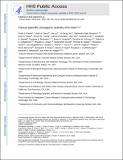Tissue-Specific Oncogenic Activity of KRASA146T
Author(s)
Poulin, Emily J.; Bera, Asim K.; Lu, Jia; Lin, Yi-Jang; Strasser, Samantha Dale; Paulo, Joao A.; Huang, Tannie Q.; Morales, Carolina; Yan, Wei; Cook, Joshua; Nowak, Jonathan A.; Brubaker, Douglas K.; Joughin, Brian Alan; Johnson, Christian W.; DeStefanis, Rebecca A.; Ghazi, Phaedra C.; Gondi, Sudershan; Wales, Thomas E.; Iacob, Roxana E.; Bogdanova, Lana; Gierut, Jessica J.; Li, Yina; Engen, John R.; Perez-Mancera, Pedro A.; Braun, Benjamin S.; Gygi, Steven P.; Lauffenburger, Douglas A; Westover, Kenneth D.; Haigis, Kevin M.; ... Show more Show less
DownloadAccepted version (3.202Mb)
Open Access Policy
Open Access Policy
Creative Commons Attribution-Noncommercial-Share Alike
Terms of use
Metadata
Show full item recordAbstract
KRAS is the most frequently mutated oncogene. The incidence of specific KRAS alleles varies between cancers from different sites, but it is unclear whether allelic selection results from biological selection for specific mutant KRAS proteins. We used a cross-disciplinary approach to compare KRASG12D, a common mutant form, and KRASA146T, a mutant that occurs only in selected cancers. Biochemical and structural studies demonstrated that KRASA146T exhibits a marked extension of switch 1 away from the protein body and nucleotide binding site, which activates KRAS by promoting a high rate of intrinsic and guanine nucleotide exchange factor– induced nucleotide exchange. Using mice genetically engineered to express either allele, we found that KRASG12D and KRASA146T exhibit distinct tissue-specific effects on homeostasis that mirror mutational frequencies in human cancers. These tissue-specific phenotypes result from allele-specific signaling properties, demonstrating that context-dependent variations in signaling downstream of different KRAS mutants drive the KRAS mutational pattern seen in cancer. SIGNIFICANCE: Although epidemiologic and clinical studies have suggested allele-specific behaviors for KRAS, experimental evidence for allele-specific biological properties is limited. We combined structural biology, mass spectrometry, and mouse modeling to demonstrate that the selection for specific KRAS mutants in human cancers from different tissues is due to their distinct signaling properties.
Date issued
2019-04Department
Massachusetts Institute of Technology. Department of Biological Engineering; Massachusetts Institute of Technology. Department of Electrical Engineering and Computer ScienceJournal
Cancer Discovery
Publisher
American Association for Cancer Research (AACR)
Citation
Poulin, Emily J. et al. "Tissue-Specific Oncogenic Activity of KRASA146T." Cancer Discovery 9, 6 (April 2019): 738-755 © 2019 American Association for Cancer Research Inc
Version: Author's final manuscript
ISSN
2159-8274
2159-8290